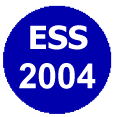
SYMPOSIUM AND EXHIBITION
| October 17-20, 2004 Budapest, Hungary |
CONFERENCE TRACKS
Simulation Methodologies, Methods and
Techniques (code: METH)
Discrete and combined discrete/continuous, simulation methodology;
Modeling formalisms (DEVS, DAE, Š); Visual modeling; Methods and
techniques in simulation and optimization; Validation and verification
techniques; Parallel processing in simulation and optimization systems;
simulation and optimization tools; Artificial Intelligence in simulation
and optimization; Intelligent simulation and optimization in Internet
Environments; Multiparadigm or multiparadigm simulation.
There is a special minitrack on: Simulation Optimization
Discrete Simulation Languages and Tools
(code: TOOLS)
Discrete simulation languages; Object oriented modeling languages; UML and
simulation; Model libraries and modularity; Component-oriented simulation;
Special simulation tools and environments; Meta-models and automatic model
generation; Graphical simulation environments and simulation software
tools; Intelligent simulation environments; Database management of models
and results; Java and Web enabled simulations.
Simulation in Business, Economy, Finance
and Commerce (code: BUS)
Macroeconomic systems simulations; Simulation of national economies;;
Business process engineering and simulation; Computer communication
networks in business and finance; Simulation in finance and risk
management; Simulation in finance and financial services; Simulation in
service industries; Dynamic business objects; Simulation in workflow;
management games; Simulation in project management; Simulating information
systems and database processes; Geographic information systems;
Performance modeling of information systems and data bases; ERP; CRM; data
mining.
Microsimulation (code: MICRO)
Simulation and decision support in social policy, industrial policy and
regional development; Microsimulation models of the household and
enterprise sector; Multi-country models; Macro-micro models; Agent-based
microsimulation models.; General framework and software architecture of
microsimulation models; Usage of geographic information systems for
microsimulation; Verification and validation of microsimulation models.
Simulation in Manufacturing (code: MANUF)
Simulation of Production and Logistic Systems, Virtual Engineering,
Digital / Virtual Factories, Virtual Production and Manufacturing
Simulation Support Tools, MRP Systems, Process Design and Control,
Embedded Intelligent Control Systems, Scheduling, Automotive Simulation,
Robotics and Automation, State-of-the-art Applications, Simulation
Frameworks, Modeling Architectures, e-Simulation Services
Simulation in Electronics, Computers and
Telecom (code: ELEC)
Modeling and simulation of analogue circuits; Modeling and simulation of
digital circuits at switch and/or at logic level; Hardware accelerators
for circuit-level simulation; Hardware accelerators for logic simulation;
Distributed simulation of circuits, components, and systems; Modeling and
simulation of computer systems; Fault simulation; Parallel and distributed
systems; High-speed networks; Network simulation software; Computer and
telecommunication systems; Telecommunication devices and systems;
Intelligent telecommunication networks; ISDN; ATM communications.
Simulation in Logistics, Traffic and
Transport (code: LOG)
Logistic Supply Chains; Supply Chain Management; Inbound logistics;
Materials management; Physical distribution; Production planning and
control; Outbond logistics; Simulation of regional logistic systems;
Distribution centers; Inventory management; Warehouse decisions; Materials
handling and packaging; Logistics network design and facility location;
Traffic flows; ulti-modal systems; Air, water, and land transportation;
Transit; Transportation modes; City transport; Transportation in
logistics; Transportation management; Traffic control; Traffic telematics;
Traffic performance; safety.
Alternative Approaches in Simulation
Technique:
Methods and Applications (code: ALT)
For many years in simulation technique the time domains analysis was
dominating. Primary purpose was to analyze some dynamic nonlinear
behavior, and solutions in the time domain played the major and only role,
based on classical state space descriptions (in case of continuous
processes) or on classical process flow descriptions (in case of discrete
event processes).
Today with the help of increased computer power and algebraic and symbolic
software tools alternative approaches and solutions can be introduced,
supporting or replacing classical time domain analysis.
This section will discuss such alternative modeling and simulation
approaches, e.g. cellular automata, pure symbolic or semi-symbolic
approaches, variational principles, Markov chains, - in comparison with
the classical time domain analysis.
It is intended to have introductory papers to alternative methods and
application papers showing the benefits of such approaches - any
applications are welcome
Page created by Alexander Verbraeck. Last update 20-03-04.
© Copyright SCS European Council and SCS
International - All Rights Reserved
